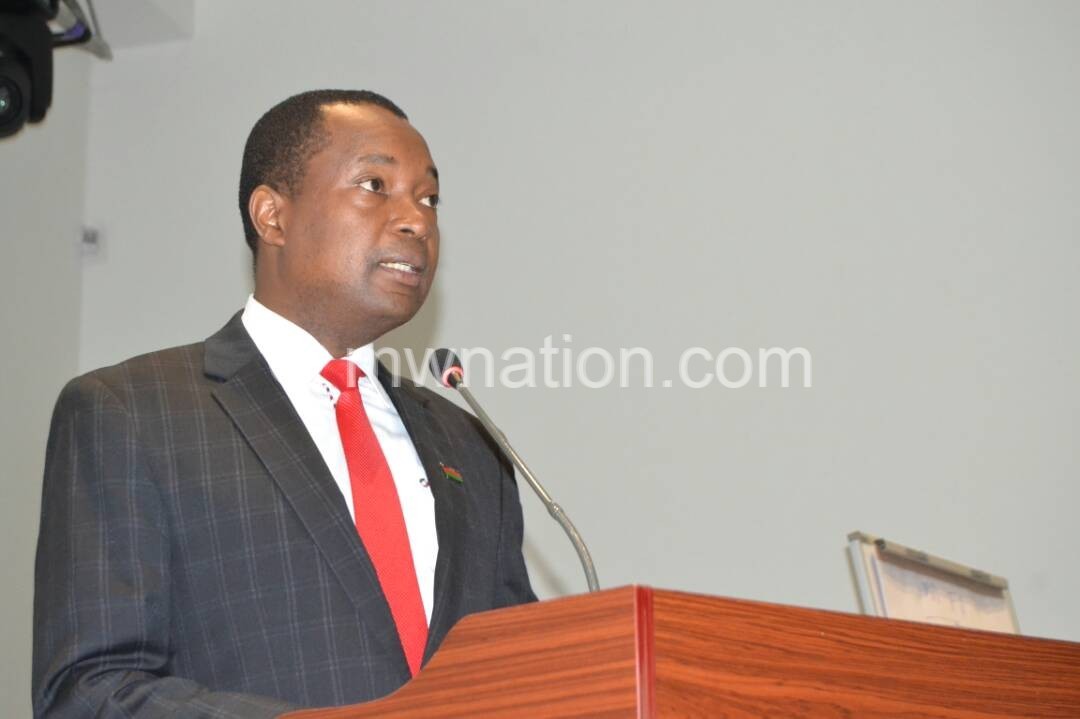‘I will focus on achieving macroeconomic stability’
President Peter Mutharika last Friday appointed Foreign Affairs Principal Secretary Dalitso Kabambe as Governor of the Reserve Bank of Malawi (RBM). Kabambe replaces Charles Chuka whose contract has expired. In this interview our news analyst REBBECA CHIMJEKA talks to the Governor to find out his vision for the economy and the country in his new role. Excerpts:

the gains
First, congratulations on your appointment as RBM Governor, our readers would want to know who Dr Dalitso Kabambe is?
I am Dalitso Kabambe , born in 1973, married to Brigitte and with three children. I am an economist with Masters and PhD degrees in Development Economics, which were obtained from Imperial College London, University of London.
I was Principal Secretary for Foreign Affairs for close to two years. I have also worked as an economist in the Economic Sector of the Government of Malawi for 19 years in various positions, including as director for Economic Planning and as budget director in the Ministry of Finance and Economic Planning.
Do you welcome this challenge?
Certainly yes. I welcome it whole heartedly and I thank His Excellency the President for appointing me to this position. I also thank the Almighty for his favour.
What are your short and long-term targets as RBM Governor?
In the very short-term, the monetary policy will be aimed at decelerating further inflation to single digit. With the current position, indications are that this will be achieved by March 2018. To achieve this, it will be important that the policy rate remains above the projected headline inflation and foreign exchange reserves will have to be maintained around three months of prospective imports.
In the long-term, the objective will be to make sure that the economy builds resilience to weather internal and external shocks. In this regard, it will mean that the macroeconomic framework rests on sufficient foreign exchange reserves of no less than six months of imports and sustaining the single digit inflation. Thus ensuring that resources are readily available to be deployed for emergencies. In short, if we achieve low inflation in the short term then the medium to long-term objective will be to build sufficient foreign exchange reserves. These fundamentals are a requisite to a durable macroeconomic framework which would in turn facilitate growth that can trickle down to every Malawian which is in line with the MGDS goals. This growth level is what some refer to as inclusive growth.
So far, the monetary policy is being relaxed as seen by the downward review of the policy rate, what should Malawians expect from your leadership as governor?
We are excited that currently inflation is on a downward trajectory, and as you have seen, the monetary policy responded positively to this development. Our ambition is to safeguard the disinflation gains attained thus far. Thus monetary policy will be aiming at striking the balance between further easing should inflation continue to decline and potential pressures which could trigger inflation such as the stability of the kwacha. This will mean maintaining the monetary policy rate above headline inflation.
Importantly, the Bank will keep an eye on liquidity developments to the extent that these will be consistent with the maintenance of the stability of the kwacha. Consequently, open market operations would continue being our main tool for managing liquidity in as much as the monetary policy rate will be following the inflation developments. This is a short-term solution to the problem.
As you might also be aware that inflation has been persistently high in the last four years, we will still be cautious of reverting to high inflation in the short to medium term. But we will still consider what could be the best approach to stimulate the economy within the ambits of the monetary policy. Currently, the Reserve Bank established the Export Development Fund with an aim of incentivising generation of foreign exchange so that the economy is able to self-sustain and reduce pressure on foreign exchange reserves from the Reserve Bank. Therefore, I will ensure that this initiative is supported appropriately in order to safeguard the viability of the supply-side bottom-line of the foreign exchange problems. So, this is more or less a long term solution to the problem.
Issues of economic growth have been thorny in the last six years, in 2006/7, since then we have been growing in real gross domestic product (GDP) at around 2.9 percent…this is not enough to accelerate economic growth. In our interview with you on Friday, you indicated that Malawi’s goal is to hit six percent growth, how do you intend to achieve this?
Unfavourable weather conditions have affected our GDP in the recent times as you are aware that agriculture contributes a significant proportion of the national output. It is pleasing to note that the economy is on a rebound. Monetary Policy will remain focused on its goal to achieve macroeconomic stability in the country characterised by low and stable inflation, a stable exchange rate as well as a stable, well-functioning, responsive and adequately capitalised banking system to cater for the needs of businesses. Monetary Policy contribution to growth is largely through the achievement of macroeconomic stability which is a catalyst for buoyant economic activity. That comes along with low cost of doing business.
You also mentioned last Friday that you want inflation to remain low and the kwacha to be very stable, how will you achieve this considering that Malawi is not an exporting nation?
As alluded to earlier on, this simply means keeping the monetary policy rate above headline inflation in the short run while at the same time managing liquidity on the money market by use of open market operations. These are fundamentals in ensuring that inflation triggers are kept at bay. So liquidity management has two fold benefits: first, minimising pressure on the exchange rate, second, denying life blood for inflation. So, these are what are readily deployable in the short-term.





